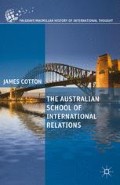Abstract
For the Australia school as in most of the English-speaking world, the intellectual territory of the early IR discipline was occupied largely by historians. If international reputation was taken as the sole criterion, W. K. (Sir Keith) Hancock was the most influential in the school. Any consideration of his work, however, runs up against the constraints of a study restricted to Australia. Hancock, of course, was Australian born and Melbourne educated; after a brief stint as an assistant to Edward Shann in Perth, he traveled to Britain as a Rhodes scholar, the established route for his generation for further academic training and elite advancement. Unlike such a figure as K. C. Wheare—Oxford scholar and author of the standard text on the Statute of Westminster—whose work once he left Australia though of considerable scholarly significance was unambiguously part of a transnational discourse, Hancock remained a direct participant in the Australian debate. Elected a Fellow of All Souls College, Oxford, he returned to Australia in 1926 to the chair of history at Adelaide and while there wrote his immensely influential Australia (1930). Although he went back to Britain in 1934 (and did not then return to Australia permanently until 1957), he went to work almost immediately, in response to an invitation from Arnold Toynbee, then director of Studies at Chatham House (RIIA), on his Survey of British Commonwealth Affairs (1937, 1940, 1941b). Interestingly, Hancock was not the first scholar to be identified as a possible author of the Survey: in early 1933, when the study was first mooted, and before funding was secured, it was stated that Walter Crocker was available to undertake the work.1 Chatham House evidently saw some utility in having an Australian (albeit with the appropriate Oxford connections) act as author. Crocker was later somewhat put out to discover from Hancock himself during an African visit that the latter was to be responsible for the project.
Access this chapter
Tax calculation will be finalised at checkout
Purchases are for personal use only
Preview
Unable to display preview. Download preview PDF.
Copyright information
© 2013 James Cotton
About this chapter
Cite this chapter
Cotton, J. (2013). W. K. Hancock: The Commonwealth and World Government. In: The Australian School of International Relations. Palgrave Macmillan History of International Thought. Palgrave Macmillan, New York. https://doi.org/10.1057/9781137308061_7
Download citation
DOI: https://doi.org/10.1057/9781137308061_7
Publisher Name: Palgrave Macmillan, New York
Print ISBN: 978-1-349-45580-5
Online ISBN: 978-1-137-30806-1
eBook Packages: Palgrave Political & Intern. Studies CollectionPolitical Science and International Studies (R0)

